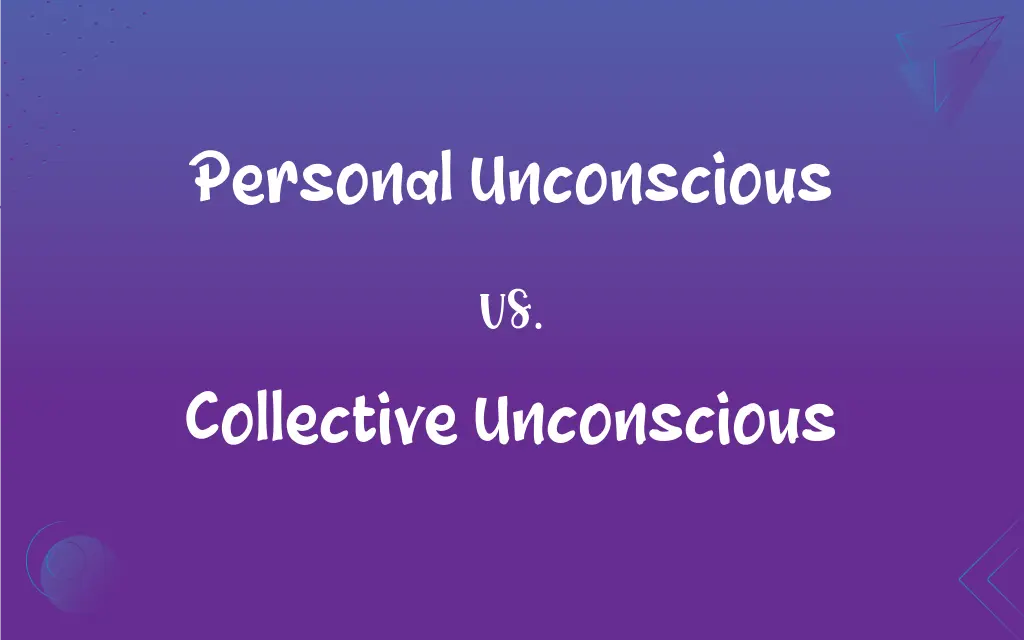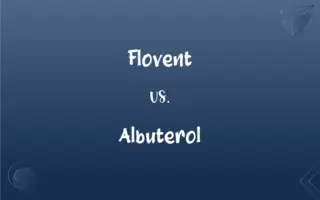Personal Unconscious vs. Collective Unconscious: What's the Difference?
Edited by Aimie Carlson || By Harlon Moss || Published on February 7, 2024
The personal unconscious contains individual experiences and memories, while the collective unconscious holds universal, inherited archetypes shared among all humans.

Key Differences
The personal unconscious is a unique reservoir of an individual's experiences, memories, and repressed thoughts. In contrast, the collective unconscious transcends individual experiences, encompassing universal archetypes and symbols shared across humanity.
Jung's concept of the personal unconscious includes forgotten information and hidden memories unique to a person. The collective unconscious, however, represents a deeper level of unconscious shared by all humans, rooted in ancestral experiences.
The personal unconscious shapes an individual's psychological makeup through personal experiences. Conversely, the collective unconscious influences broader human behaviors and instincts through shared archetypal themes.
Memories and personal traumas reside in the personal unconscious, impacting an individual's behavior and personality. The collective unconscious, on the other hand, contains archetypes like the Hero, the Mother, shaping collective myths and cultural motifs.
The personal unconscious is shaped and developed throughout a person’s life, while the collective unconscious is considered timeless and universal, transcending personal experiences and cultural boundaries.
ADVERTISEMENT
Comparison Chart
Content
Individual experiences and memories
Universal archetypes and symbols
Influence on the Individual
Shapes individual psyche
Influences universal human behaviors
Development
Developed over a person's life
Innate and timeless
Universality
Unique to each individual
Shared across all humans
Role in Psychology
Addresses personal issues and traumas
Explains shared human experiences
ADVERTISEMENT
Personal Unconscious and Collective Unconscious Definitions
Personal Unconscious
Personal unconscious holds forgotten experiences.
His fear of water stemmed from a repressed memory in his personal unconscious.
Collective Unconscious
Collective unconscious contains shared human instincts.
Our innate fear of darkness is rooted in the collective unconscious.
Personal Unconscious
Personal unconscious is a reservoir of personal memories.
Therapy helped him access painful memories in his personal unconscious.
Collective Unconscious
Collective unconscious transcends personal experiences.
Cultural symbols and rituals often emerge from the collective unconscious.
Personal Unconscious
Personal unconscious contains individual repressed thoughts.
Dream analysis revealed hidden desires in her personal unconscious.
Collective Unconscious
Collective unconscious encompasses universal human archetypes.
The hero's journey in the story resonated with the collective unconscious.
Personal Unconscious
Personal unconscious includes individual’s suppressed emotions.
Her sudden anxiety was linked to unresolved feelings in her personal unconscious.
Collective Unconscious
Collective unconscious shapes collective human behaviors.
The archetype of the mother figure is a powerful aspect of the collective unconscious.
Personal Unconscious
Personal unconscious is unique to each person's history.
His personal unconscious was filled with memories of his childhood adventures.
Collective Unconscious
Collective unconscious is inherited and universal.
Myths from different cultures share themes from the collective unconscious.
FAQs
What are archetypes in the collective unconscious?
They are universal symbols and themes innate to human psychology.
What is the collective unconscious?
It's a deeper layer of the unconscious shared by all humans.
Is the personal unconscious unique to each person?
Yes, it's shaped by individual life experiences.
What is the personal unconscious?
It's the part of the mind holding individual memories and experiences.
Can the personal unconscious be accessed?
Yes, through therapy and introspection.
How does the personal unconscious affect behavior?
It influences behavior through repressed memories and experiences.
Does the personal unconscious include forgotten memories?
Yes, it contains memories not currently in conscious awareness.
Are dreams connected to the collective unconscious?
Yes, they often express universal archetypes.
Are cultural rituals linked to the collective unconscious?
Yes, they often reflect universal human themes.
How does the collective unconscious manifest?
Through dreams, myths, and cultural symbols.
How is the collective unconscious studied?
Through anthropology, psychology, and the study of myths and symbols.
Does everyone access the collective unconscious?
In a sense, yes, through shared human experiences and instincts.
Is it possible to become conscious of the personal unconscious?
Yes, through self-awareness and therapeutic work.
Can personal unconscious influence mental health?
Yes, unresolved issues in it can affect mental well-being.
Does the collective unconscious evolve over time?
It's relatively stable, representing timeless aspects of humanity.
Are the concepts of personal and collective unconscious widely accepted?
They are influential in psychoanalysis, though some aspects are debated.
Is the collective unconscious the same in everyone?
Yes, it's a shared heritage of human evolution.
How do therapists work with the personal unconscious?
Through techniques like psychoanalysis and dream interpretation.
Does the personal unconscious store traumas?
Yes, it can hold traumatic memories not fully processed.
Can the contents of the personal unconscious change?
Yes, as new experiences and memories are formed.
About Author
Written by
Harlon MossHarlon is a seasoned quality moderator and accomplished content writer for Difference Wiki. An alumnus of the prestigious University of California, he earned his degree in Computer Science. Leveraging his academic background, Harlon brings a meticulous and informed perspective to his work, ensuring content accuracy and excellence.
Edited by
Aimie CarlsonAimie Carlson, holding a master's degree in English literature, is a fervent English language enthusiast. She lends her writing talents to Difference Wiki, a prominent website that specializes in comparisons, offering readers insightful analyses that both captivate and inform.







































































